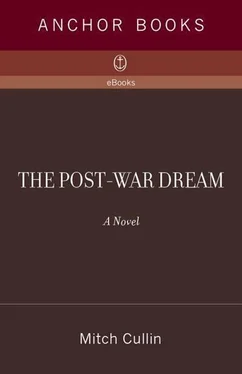More often than not, Hollis disregarded his uncertain thoughts of international police action and likely combat, eavesdropping instead on those close at hand, listening with eyes shut to a cacophony of voices — the bad jokes, the raucous laughter, the crass innuendoes — like a discordant choir accompanying the ship's creaking, metallic gyrations. The majority of them were younger men, most no older than eighteen or nineteen, while some had just barely reached seventeen, joining up after their parents had consented by signing the recruitment forms. Hollis, however, was already twenty, and although the age difference was minor, he felt displaced and out of rhythm with the quick, adolescent banter of his peers; they appeared, to him, like unruly kids left to fend for themselves, or perhaps wild things banded together by necessity and somehow holding one another in check.
“Look at that peckerwood, just look at him go.”
“Goddamn, man, that ain't right.”
“I fold, damn.”
“Yep, I hear you. I fold.”
“Hey, which one of your rotten crotches didn't ante?”
“Don't look at me.”
“This is bullshit. Who didn't ante?”
One blustering voice was interchangeable with another — all their voices cut from the same cloth yet remaining singular — like the uniforms they wore, like the equipment they toted, like the similar rankings they were assigned and the robotic drills which were now performed as second nature; with rarely an exception, every soul huddled in the foul belly of the ship, including Hollis, was a trained rifleman for the army personnel parlance, each classified to an identical set of numbers. Except the faces and bodies were different, some more so than others, and among them was a particular oddity: a Chinese American private from Seattle named Schubert Tang — two of the darkest eyes Hollis had ever seen, coarse black hair cropped short, shiest kid in the battalion but a skillful poker player, wire thin and delicate, with almost a girlish appearance — whose three older brothers had served before him in the Second World War.
So while the men horsed around, or suffered from seasickness, or bantered with the tacky obscenities of soldiers, only a couple of them stood out perfectly in Hollis's memory — one of whom was Schubert, a Browning Automatic Rifleman, that solitary Asian in a den of mostly white faces. At the outset of the crossing, it became apparent that Schubert was very intelligent and very friendly, if not also rather quiet, and who, in spite of being Chinese, would have made excellent officer material in the future. But he looked like the youngest of them all, much closer to fourteen than his actual eighteen years — with smooth, unblemished skin which, to the amazement of some, had never felt the touch of a shaving razor. Moreover, it was Schubert who understood where they were going, who knew a lot about that place called Korea, who had even been able to locate it on a map well before the rumblings of civil war had begun. In the middle of playing cards, questions were thrown at him concerning the country, especially since many, including Hollis, had assumed the differences between the Chinese and the Koreans were negligible; and as he spoke, answering and then elaborating on what had been asked, the game would be put on hold for a spell — every-one listening to him, sometimes straining to hear him because his voice was so soft, then ribbing him afterward that only a North Korean spy could possess such information.
But with every question asked, Schubert would become unusually talkative, offering long explanations which were given in painstaking detail. He told them it was okay to think of Korea as a bridge for China and Japan, but that the country also had its own rich history which stretched back five thousand years. The nation, he said, was born after a god named Hwanung, who descended from Heaven and turned a bear into a beautiful woman; the woman eventually gave birth to Hwanung's son, and it was that son who, as an adult, ended up building the capital of Korea. Subsequently, as the hours passed with the chaotic, metronome-like sway of the ship, more would be gleaned from Schubert. He told of the Korean king who, in 1420, created a phonetic language for his people, using eleven vowels and seventeen consonants, forming the written language of Hangul. The same king invented the sundial and water clocks. Yet while he painted an alluring picture of that strange, unknown land, Schubert didn't avoid those recent junctures in history which, as a result, had set them sailing across the Sea of Japan: the annexation of Korea by the Japanese in 1910, the nation then humbled into a mere colony, a territory which remained under Japanese control until the Pacific War ended some thirty-five years later. And though he could go on endlessly and in great detail about where they were headed, the men did nothing to interrupt him, preferring instead to listen carefully to the shy Chinese kid from Seattle, perhaps regarding him as one who, by the sheer virtue of his otherness, might somehow hold the key to their survival.
There was, however, a soldier from Texas who truly stood above the rest — at least it seemed as such to Hollis — and whose gregarious presence was difficult to resist or shun. His name was Bill McCreedy, although he often referred to himself in the third person, saying things like “Boy, Creed sure wishes he could hunker down on a hamburger,” and “Scoot on over, give ol’ Creed a place to sit.”
From his cot, Hollis spied McCreedy making the rounds, pausing to borrow a cigarette off someone, striking up conversations with those who crossed his path, or leaning for a while against a bulkhead and, exhaling smoke through his nostrils, coolly surveying the groupings of fellow privates as if they were under his stern command. But he was well regarded by pretty much everyone; in fact, McCreedy had an affable yet dominating nature which attracted others to him, and whomever he spoke with was given the distinct impression they were, at that moment, his closest buddy. Moreover, he knew how to take the lead in any situation — playing poker, shooting the breeze, undertaking various work details — assuming the role of team captain without really trying, smiling as he barked out instructions or orders which were never questioned. His very aura suggested not only power and cunning but, like those who seemed destined for grander heights, an innate ability to get things accomplished his way, doing so with an effortless grin and a benign pat on the back.
Which was why Hollis steered clear of McCreedy, avoiding his overbearing proximity ever since they had all gathered on a Yokohama pier, refusing to meet his dark blue eyes once they were finally secured below deck. The two had brushed shoulders twice, and both times Hollis had kept his stare either aimed forward or at the floor, simply nodding after McCreedy said, “Pardon me, friend.” And while he recognized the inexplicable allure of McCreedy's personality, Hollis was also mystified by the admiration it evoked; for he, too, was drawn to this slightly younger man, casting discreet glances whenever that Texan drawl reverberated, watching at a distance and hoping to remain inconspicuous. He couldn't deny or begin to understand the attraction for such a swaggering, cocksure private — someone who, had the circumstances been otherwise, might have gone unnoticed had Hollis passed him on the street. But he refused to believe it was McCreedy's good looks which made him so appealing — the broad shoulders, the above-average height, the golden-blond Mohawk haircut, the muscular forearms. No, he eventually concluded, it was something else — something primal and unique, something, possibly, which he had always lacked.
Yet try as he might, Hollis could not escape McCreedy's unwanted attention, that vexatious need to make contact with everyone around him. And so when half awake upon his cot — two days after the wavering voyage began, resting despite the ship's continual turbulence — Hollis stirred to the sound of a throat clearing above him, and before lifting his eyelids, he heard that familiar lengthened tone asking, “Well — how on earth did you end up here?” His vision was fuzzy at the second his eyes shot open, but soon he distinguished the imposing figure looming over him, noticing first a thin wisp of grayish smoke floating between him and McCreedy. “Sure didn't mean to spook you,” said McCreedy, a cigarette bouncing in a corner of his mouth, staring down at Hollis with an amused expression.
Читать дальше










![Theresa Cheung - The Dream Dictionary from A to Z [Revised edition] - The Ultimate A–Z to Interpret the Secrets of Your Dreams](/books/692092/theresa-cheung-the-dream-dictionary-from-a-to-z-r-thumb.webp)

